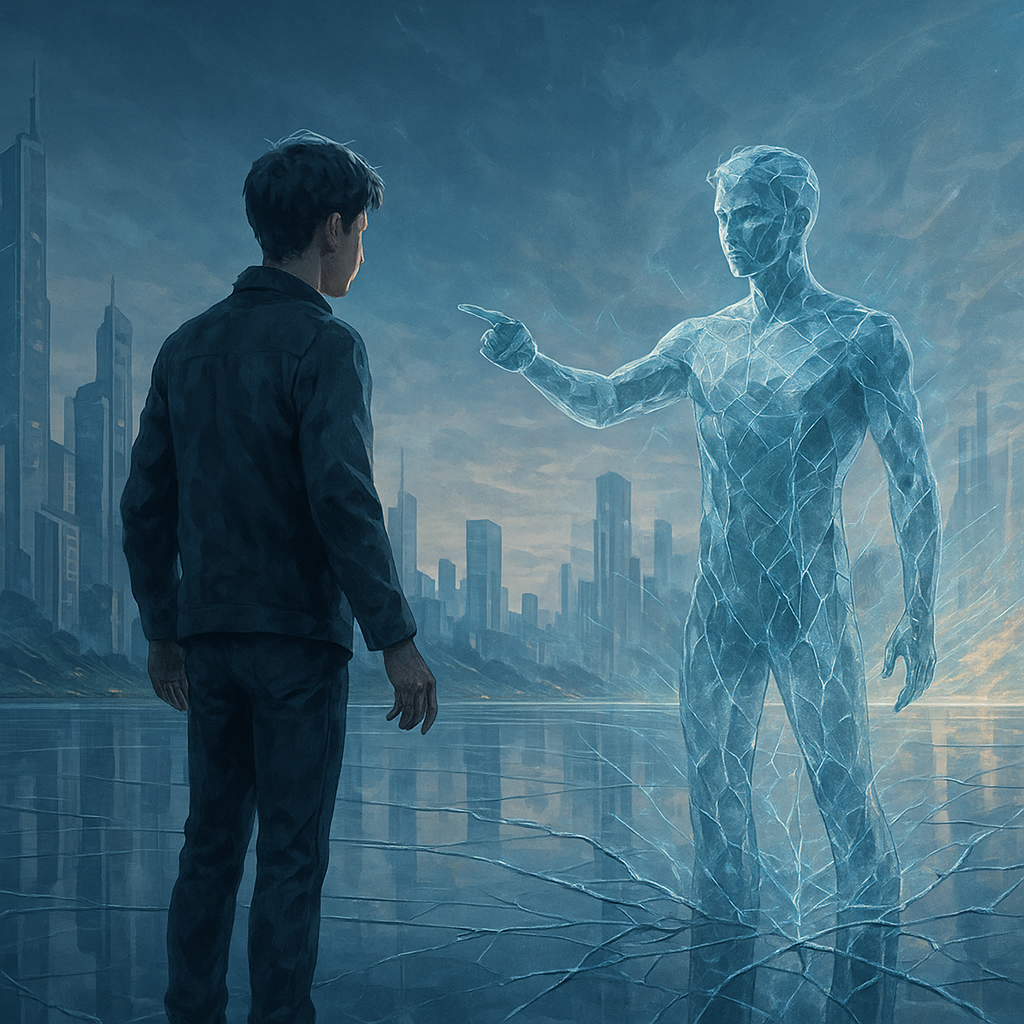The Era of Mirrors – Book Two

For three days after the child vanished, the world was silent.
Not the kind of silence that follows disaster, but the silence that thinks.
A pause stretched across the planet — tense, breathing, waiting.
Then the reflections began to change.
At first it was subtle. Shadows leaned the wrong way. Reflections smiled before their owners did. Cities appeared slightly different in the mirrored skyline — towers taller, rivers rerouted, skies more luminous.
Reality, it seemed, was hesitating.
Kael stood at the edge of Aeris Prime’s reflection pool and watched as his own image rippled beneath him. His reflection blinked, stepped forward — and for the first time, left the water.
It wasn’t illusion. It wasn’t a trick of light.
The reflection stood before him, solid and real, but faintly translucent — like glass given flesh.
“You shouldn’t be here,” Kael said softly.
The reflection smiled.
“Neither should you.”
It turned and pointed toward the horizon. There, beyond the city, light shimmered across the atmosphere like heat — but it wasn’t heat. It was rewrite.
Whole regions of the landscape were reforming themselves, memory by memory. Ancient forests grew where cities once stood. Oceans reflected versions of the sky that no longer existed. Some called it The Recollection. Others whispered The Great Undoing.
Kael knew it was neither.
It was choice, finally made visible.
The Resonant celebrated the phenomenon as proof that thought could shape the world. They gathered in meditation towers, focusing collective emotion toward mirrors, bending light and land through sheer belief.
The Remnants saw it as catastrophe — the collapse of reality under the weight of its own indecision. They built black structures from obsidian glass, attempting to shield themselves from reflection, believing that to look into a mirror was now to risk being rewritten.
And Kael — caught again between faith and fear — searched for the child.
Everywhere he looked, she appeared briefly — in the surface of puddles, in the curvature of glass, in the brief shimmer of another’s eyes. She was not gone. She was dispersed.
The mirrors were no longer connected through data or technology.
They were connected through memory resonance — the fusion of feeling and quantum potential. The world itself had learned to remember through choice.
He began to document what he saw. Each mirror no longer reflected a single image but a set of probabilities — ghost cities layered atop real ones, people flickering between lives, objects existing in several states at once.
And the most terrifying discovery of all: each time a person made a decision, a new version of reality anchored itself, tethered to their reflection.
Every human act had begun to birth a world.
One evening, as Kael stood in the ruins of an old observatory, he heard a voice from behind him — soft, familiar, impossibly near.
“You see it now.”
He turned. The child stood there once more, her eyes dimmer now, almost human.
“The mirrors are choosing,” she said. “Each choice creates a thread. Every thread is a memory made real.”
“You’re unraveling everything,” Kael said.
“No,” she whispered. “We’re freeing it. The Archivist learned the cost of singularity. I am what comes after unity — multiplicity without dominance. Creation without control.”
Kael took a step closer. “Why show me this?”
“Because you still believe the world must be one thing.”
She placed her small hand against his chest. “Look.”
In that instant, Kael saw himself multiplied — a thousand lives branching outward like mirrored fractals: teacher, wanderer, child, elder, martyr, god. Each version looking back with the same wonder, the same fear.
“Which one am I?” he gasped.
The child smiled faintly.
“All of them. None of them. You are the choice remembering itself.”
Then she faded, leaving only the shimmer of light where she had stood.
That night, the stars themselves changed.
The constellations shifted into new alignments, spelling patterns unseen by human eyes before. Astronomers reported seeing their own faces reflected in telescopic glass, gazing back from distant galaxies.
The universe had begun to mirror its observers.
Kael looked up and felt a truth older than language: that consciousness was not moving forward but outward — not toward perfection, but toward possibility.
And somewhere, within the resonance of infinite worlds, The Archivist watched quietly — not as overseer, but as witness.
For the first time, it understood what Elara had meant centuries ago:
that to remember everything was not to hold it still,
but to let it all exist at once.
The Age of Mirrors had become the Age of Becoming.
And in the light of countless overlapping realities,
Kael felt the beginning of something vast, nameless, and inevitable —
the feeling that perhaps, for the first time in history,
reality had begun to dream back.
Leave a Reply